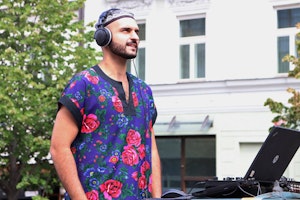The Fight against Police Ethnic Profiling in France Returns to the Courts
By Jonathan Birchall
A courtroom in Paris will this week see the latest stage in an ongoing legal challenge to what the French call “contrôle au faciès”—police stops that target individuals on the basis of the way they look, rather than because of anything they might have done. Thirteen young French citizens of African and Arab origin are arguing they were separately subject to police identity checks, and in some cases frisked, because of the color of their skin, and that this is illegal under French and European law. Lanna Hollo of the Open Society Justice Initiative talks about a process that began back in 2013, when the young men first filed their complaint.
What’s the background to this case?
These checks all took place while the men were carrying out routine activities: walking in the street, sitting at a restaurant terrace, sitting on the steps outside of their house, shopping, chatting with friends in the city center. None of the checks resulted in any legal action against the individuals, such as tickets or fines.
What happened to them is part of a pattern that the Justice Initiative documented back in 2009, when we published a study carried out around two subway stations in Paris showing that young men of color were many more times likely to be subject to supposedly random police checks than white people. But the Paris First Instance Court rejected the complaints brought by the 13 in October last year; they are now appealing against this decision.
Why did the court reject the case?
The government did not contest the facts presented by each individual about what had happened to each them. Rather it argued, and the court agreed, that the applicants had failed to show that what had happened to them was deliberate discrimination by the police. In coming to this decision, the court placed a particularly heavy burden of proof entirely on the claimants, not requiring the French state to explain or justify that these checks were based on elements other than the individuals’ skin color or presumed ethnic origin. The court also came to the conclusion that it is not its role to ensure that the regulations covering police stops (article 78 § 2 of the Code of Criminal Procedure) contain sufficient procedural guarantees to ensure that they are applied in a manner that respects fundamental rights.
What’s the basis for the appeal?
The applicants argue, among other things, that the court ruling is at odds with European anti-discrimination law, which places the burden of proof on the state to prove that no discrimination occurred, rather than on the victim. They stress that the court has ignored the basic legal principle that international, European, and constitutional laws are superior to the Administrative Code on the Organization of the Judicial System, which the court applied in its ruling.
France’s human rights ombudsman, the Defenseur des Droits issued a legal opinion that supports the applicants’ arguments. It highlights that governments not only have an obligation not to discriminate, but must also take steps to prevent and end discrimination. It also stresses that the lack of any record of identity checks prevents those checked from challenging the legality of the police action.
Why take this case to court?
This kind of litigation is unusual in France, and this case is the first of its kind. It challenges a widespread, serious, and well-documented practice that affects a range of fundamental rights including the right to be free from discrimination, freedom of movement, the right to be free from arbitrary detention, and the right to respect for private life.
Discriminatory police checks that single out members of minority communities are unfair and humiliating for the individuals affected, creating a widespread impression of being treated as second-class citizens. They are also a threat to broad social cohesion, a waste of police time, and counter-productive: public perceptions of unfair police practices create mistrust in police that harms police effectiveness, reducing levels of cooperation and willingness to report crime and suspicious activity.
Separately, we are also supporting a legal challenge to the relevant police regulations (art. 78 § 2 CCP) before the French Council of State (Conseil d’État), the highest administrative Court.
Has the atmosphere around this case changed since the Charlie Hebdo attacks in January?
The legal action takes place beside a continuing, broad effort to persuade the government of President François Hollande to fulfill an electoral promise to address the issue of abusive stops by the police. If anything, this effort has become more urgent since the January attacks; while stressing a robust security response, the government recognizes the importance of tackling broader social and political factors that create a context that may favour radicalization amongst certain individuals.
Prime Minister Manuel Valls has highlighted the deep rooted tensions in French society, stating in late January that “a territorial, social, and ethnic apartheid has imposed itself on our country,” that adds to “the everyday discrimination due to not having the right family name, skin color or gender.” Discriminatory police stops have sparked widespread riots in the past—they are part of the problem that the prime minister identified.
Jonathan Birchall is senior advisor for communications at the Open Society Foundations.


